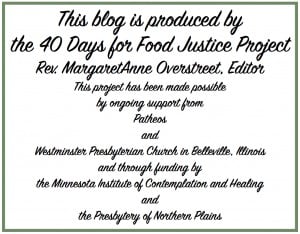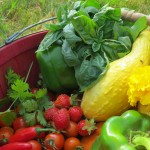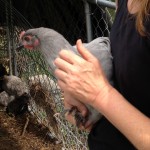Ash Wednesday is upon us and we are once again entering into the season of Lent.
We transition from Fat Tuesday to Ash Wednesday; we move from feasting to fasting.
As you move into this time of preparation, use the Lenten disciplines below to help create for yourself and your family a deeper awareness of global issues of food justice, as well as the implications of your personal food choices.
And don’t forget to sign up to receive this blog by email, so that you can read the stories, resources, prayers, and reflection questions that will be posted here for the 40 days of Lent.
Commit to making the 40 days of your Lenten journey count. Make them 40 Days for Food Justice.
40 Days for Food Justice
Lenten Calendar
FEBRUARY 18
Read 1 Cor 8:1-13 and 13:1-7. Think about food and faith. Plan a regular time of day to engage in your Lenten discipline.
FEBRUARY 19
PAY ATTENTION! Make a list of everything you eat and drink today. Donate a dime for each thing on your list.
FEBRUARY 20
Movie Night! Watch this PBS video on Food, Faith and Ethical Eating: video.pbs.org/video/1543979487/
FEBRUARY 21
Open a cabinet and take out any 5 items of food. Read the labels. Donate a nickel for each ingredient that you don’t know what it is.
FEBRUARY 22
Invite someone to share a meal with you. Choose someone who you don’t normally share a meal with.
FEBRUARY 23
Read Luke 24:13-35. Think about the way Jesus is revealed at our tables.
FEBRUARY 24
Write a mealtime prayer, offering your thanks and asking for God’s blessing.
FEBRUARY 25
Read Mark 14: 17-26. Tonight at your evening meal, set an extra place. Imagine that Jesus is eating dinner with you.
FEBRUARY 26
Consider the place of food in our society. Ask God to show you what is broken in our food system.
FEBRUARY 27
Read Wendell Berry’s essay, “The Pleasures of Eating” at: ecoliteracy.org/essays/pleasures-eating
FEBRUARY 28
Read Isaiah 25: 6-10. Consider what it means to “feast”. What does God’s abundance look like?
MARCH 1
Read Leviticus 11:1-12. Then read the Environmental Working Group’s “Dirty Dozen”: www.ewg.org/foodnews/
MARCH 2
Read Matthew 8:1-4, 19:13-15. Think about how Jesus cares for our physical bodies.
MARCH 3
Is there one small thing that you can change about your eating habits that would improve your health?
MARCH 4
After your evening meal, notice how much you’re throwing away. Donate $1 for each family member that wasted food.
MARCH 5
Commit to boycotting (or muting) television commercials for a few days.
MARCH 6
How far do you have to walk to get clean drinking water? Count your steps and donate a nickel for each step.
MARCH 7
Plan a meal today with friends; invite your guests to share stories at the table.
MARCH 8
Commit to switching to fair trade coffee, tea and/ or chocolate for a month.
MARCH 9
How many healthy children do you know? Donate a quarter for each of them.
MARCH 10
Give a quarter for each meal eaten in a restaurant (or fast food) by a member of your household in the last week.
MARCH 11
Tonight, make a meal without any animal products. Donate a quarter for each fruit or vegetable you eat today.
MARCH 12
Do you know someone who works with hungry people? Send them a thank you note.
MARCH 13
Ever wonder about food and climate change? Read up on it: awfw.org/climate-advanced/
MARCH 14
Shop around the perimeter of the grocery store when you grocery shop this weekend. Avoid processed foods.
MARCH 15
Cook a meal this week without using animal products from factory farms. Look for products that are “humane certified”.
MARCH 16
Read 1 Cor 10:23-33. Donate fresh food items (especially locally grown) items to the food bank.
MARCH 17
Investigate local farmers’ markets, CSAs or other places to buy locally grown food. See www. localharvest. org
MARCH 18
Read Psalm 104. Look online or in books to find mealtime prayers that express your feelings about food.
MARCH 19
Read Genesis 1:29-31. Buy / eat 5 foods this week that help you celebrate God’s gift of food.
MARCH 20
Want to see what factory farms are really like? Watch fowlplaymovie.com (Not for the faint of heart.)
MARCH 21
Read Psalm 34. Take a few moments each day for the rest of Lent and pray for hungry people.
MARCH 22
Provide food for coffee hour that is organic and locally grown. Or make sure the church is providing vegetarian options at all church events.
MARCH 23
Look up “world hunger” on the Internet and read through the resources you find.
MARCH 24
Read Matthew 13:31-33. Sign up for a healthy cooking class or invite friends to come together to prepare a healthy meal.
MARCH 25
Read Mark 12: 28-34. Check with local restaurants to see if you can find places that are serving local, organic foods. Make a reservation to eat there.
MARCH 26
Read Mark 7: 24-30. Consider how you could advocate for a better world. Go online to Bread for the World: www.bread.org
MARCH 27
Read up on food waste: www.soundvision.com/info/life/wasteinamerica.asp
MARCH 28
Read Daniel 1:1-21. Do you feel that your faith commands you to make particular food choices? Discuss them with someone.
MARCH 29
Look back over your Lenten discipline and this calendar. What have you learned? What changes have you made / will you make?
MARCH 30
Today, fast from all drinks except water, in solidarity with those who don’t have clean drinking water.
MARCH 31
Today, fast from eggs and milk, in solidarity with those who don’t have access to such gifts of creation.
APRIL 1
Today, fast from sugar, Pray for the obesity epidemic in the U.S. and rising obesity rates around the world.
APRIL 2
Today, fast from highly processed foods. Pray for those who do not have access to healthy food options.
APRIL 3
Today, fast from desserts and sweet foods. Pray for harvests of healthy and sustainable foods around the world.
APRIL 4
Today, fast from meat. Pray for those who lack protein in their diet.
————————————
In addition to being the founder and editor-in-chief of the “40 Days for Food Justice Project”, the Rev. MargaretAnne Overstreet is a mom, a Presbyterian pastor, and a certified Health Coach. She does ministry with and among the good people of Westminster Presbyterian Church in Belleville, Illinois, where she gets her hands dirty in the community garden and, every Sunday, preaches with bare feet. She treasures family time, relishes every opportunity to teach and write about food justice, and loves to play outside with her dogs. Find out more about her at www.AnInBetweenPlace.com
Sign up to receive the daily meditations by email, or like us on Facebook.













